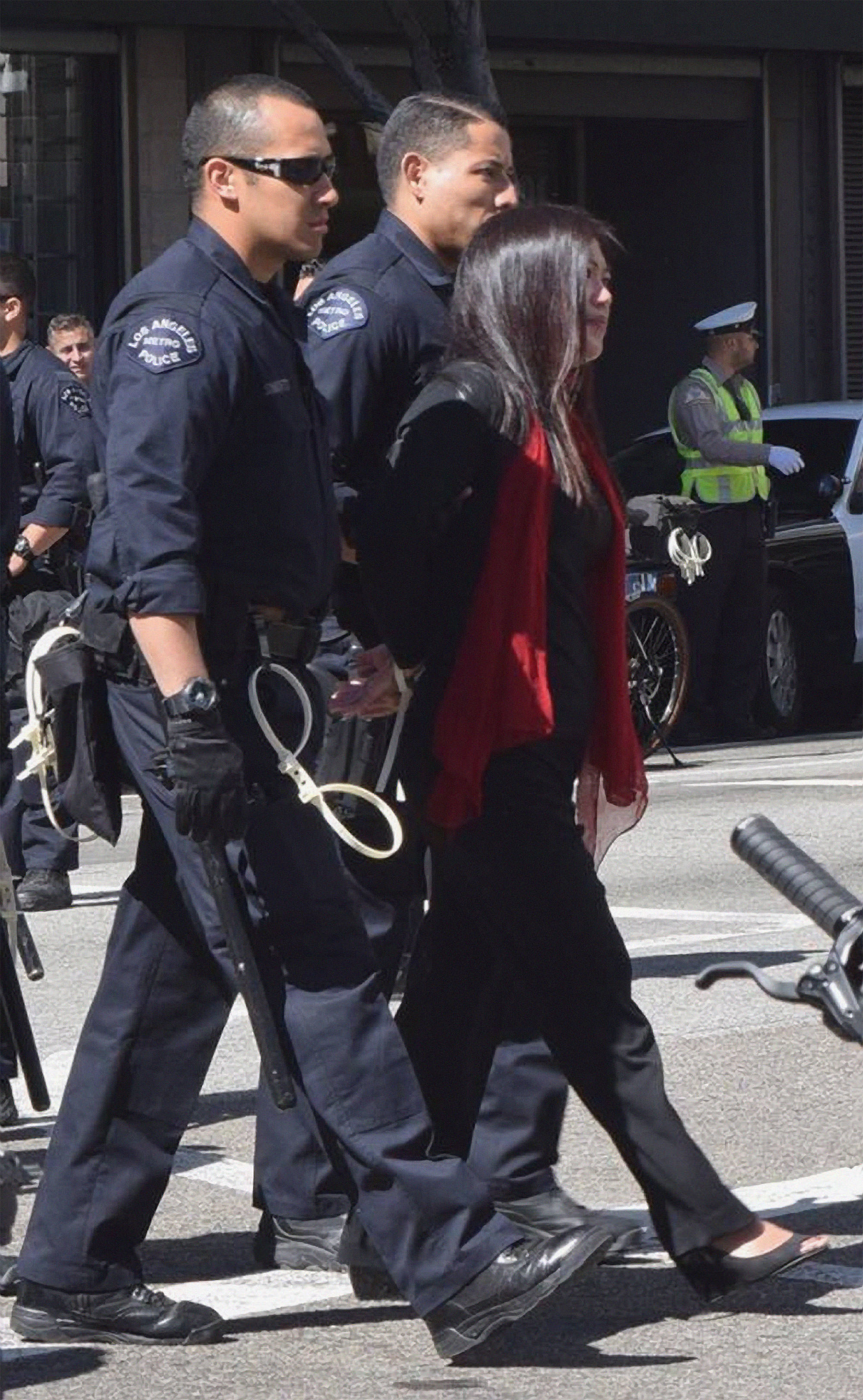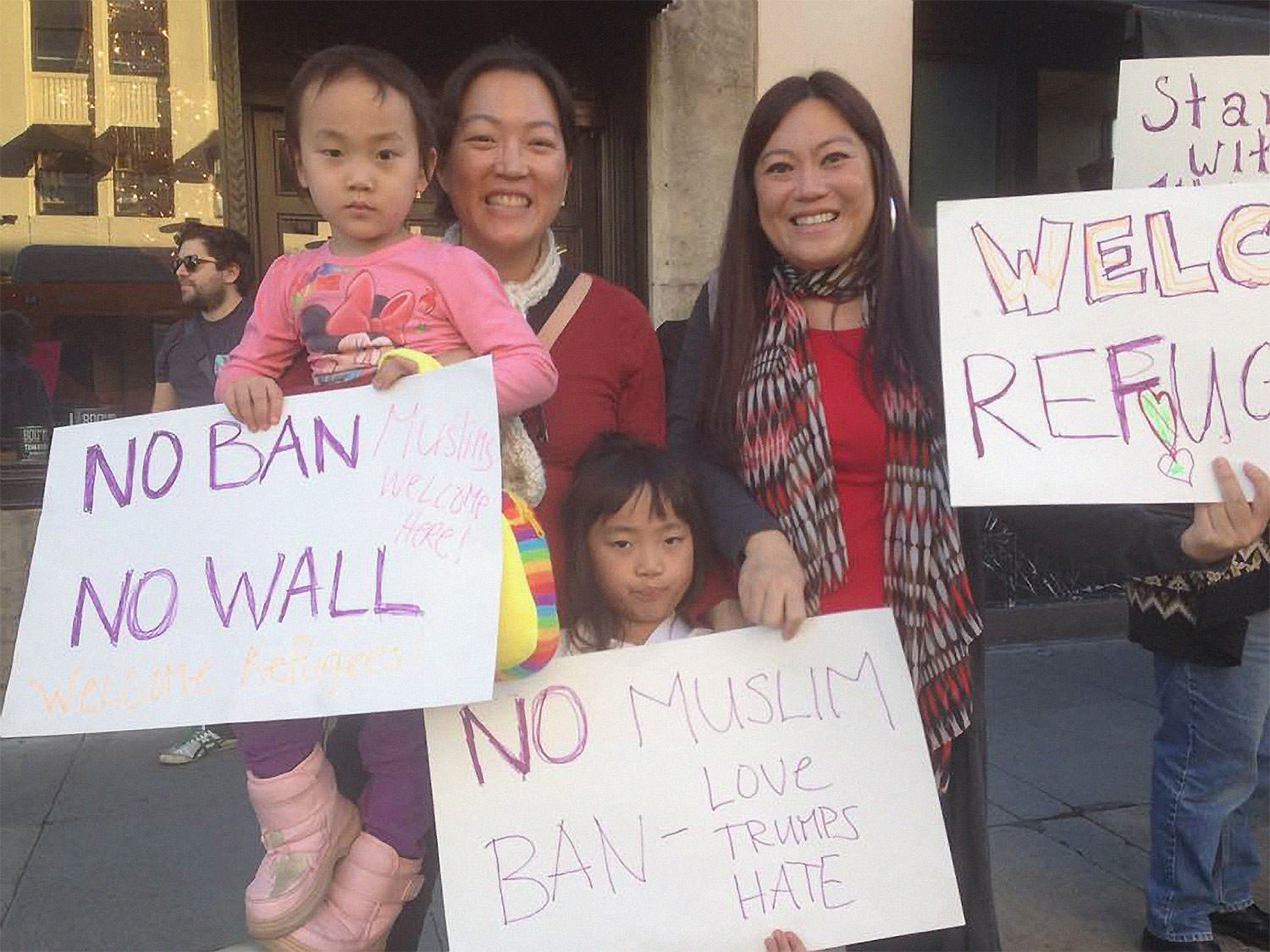
Imagine a suburban city in America which, in response to a rapidly growing Asian immigrant population, tries to make English the official language of the city, while also attempting to pass an ordinance that requires all business signs to display English lettering.
This was Monterey Park in the 1980s, the city in which public interest and civil rights lawyer Betty Hung grew up amidst the growing racial tensions surrounding that particular ordinance. While the English-only movement was eventually quashed, it brought to light the way in which an influx of the “other” can cause general panic among those who wish to maintain a majority within their city.
Betty, who now works as policy director of Asian Americans Advancing Justice-LA and serves on the board of Clergy and Laity United for Economic Justice (CLUE), recalls the racism she encountered while in high school, saying, “I remember growing up and being made fun of for speaking Taiwanese as a kid. We grew up in Alhambra, which was mainly white and Chicano, and I remember the anti-Asian and anti-immigrant backlash.”
This experience instilled in Betty a “sense of always rooting for the underdog” as she went on to college at Harvard, where she quickly became involved in the Minority Student Alliance and Asian American Association. She became a student activist, involving herself in multi-racial student organizing. This was Betty’s first taste at coalition building, a skill that she continues to hone and utilize in her work today. She went on to Yale Law School — the first in her family to become a lawyer. While attending school, felt a keener sense of alienation than she had ever experienced before.
“I felt at a loss. But I think experiencing that sense of alienation and exclusion was important. We can either develop empathy for others or react by looking out for ourselves and our own. Having that direct experience of alienation has helped me to understand others better in my work now.”
At Advancing Justice-LA, Betty has worked to seek immigration and racial justice, building strong relationships with other organizations across racial lines. “For the last 20 years,” she recalls, “ever since I graduated from law school, almost everything I’ve been doing has been part of a coalition. Given a city as diverse as L.A., we have to work in partnership and collaboration. With any issue, no matter what that issue is, we have to recognize that Asian Americans are not the only ones impacted — everyone is. There is power and strength in numbers when we join together.”
Despite her own efforts, Betty has found it quite challenging to raise awareness that Asian Americans are more connected to social justice issues than has been popularly acknowledged.

“There are many undocumented APIs, about 1.6 million in the U.S. And L.A. has more undocumented APIs than anywhere else in the country, about 130,000.” It’s clear that immigration issues do not only concern Latinx, but a vast number of Asian Americans as well, yet, as Betty observed, “the mindset of many is individualistic — a ‘we did it by the bootstraps and we’re going to pull the bootstraps up after us’ kind of mentality, instead of helping each other.”
Betty has worked with groups that purposefully seek coalitions with Asian America groups. The notions of collaboration and empowerment of those directly impacted by social justice issues have shaped the outcomes of many of Betty’s projects.
One project was Deferred Action for Childhood Arrivals (DACA), an immigration policy that allowed those who entered the U.S. as undocumented immigrants while they were minors to defer deportation action for two years and receive work permits in the meantime. One of the first DACA meetings was held at Betty’s house, where she engaged with immigrant youth around the issue, providing legal aid to the youth leadership team.
Betty says, “From the beginning of the development of the campaign, DACA was led by immigrant youth. When I attended a White House meeting with them, it was the immigrant youth leaders who engaged the house officials. Seeing their courage, strategic leadership, and how they won was inspiring to me.”
Later, Betty helped to establish the Asian American Pacific Islander (AAPI) DACA Collaborative. Her pride was unmistakable as she spoke of ways that the non-Asian American immigrant youth fought for the AAPI community. “[The immigrant youth] were also really inclusive and supportive of undocumented AAPI youth getting involved; their work was really intersectional.”
The idea of intersectionality and working across racial lines is paramount to Betty’s work, as she is always looking around to see who should be represented in leadership and decision making. “Right now we have to be intersectional and show true solidarity, expanding our concept of ‘we’ until we’re always thinking about who should be at the table, always asking how we are ensuring that everyone is included — especially those who are directly impacted. We need to be looking for more than just their stories; we need their input into how we share our resources, funding, and access.”
Recently, the power of diverse coalitions was put to the test when Betty worked with partners, including the LA Urban League, the Central Market Resource Center, the LA United Methodist Urban Foundation, Latino Latina Roundtable, and the NAACP to push for legislation that would make higher public education more accessible to students from low income, English learning, and foster care backgrounds by establishing an education pipeline of support. Working with Senate President pro Tempore Kevin de León, Betty and the coalition worked to pass legislation that would allocate $200 million to a K-12 College Readiness Block Grant that would promote educational accessibility and support to these students, and another $40 million to other programs that would work to give underrepresented students a fair shot at accessing higher public education.
Betty doesn’t have any background in education, but felt that this was something that needed to be done. When the coalition succeeded in passing the legislature, Betty said, “I’ll be honest; it was a surprise that we won right away, and I really think it was God. God brought me here with my background in coalition building and a career spent working with Latinos and African Americans and he put me in this place for a reason. And I think it was because of God that we won. So many things happened that aligned, like Kevin de León, the most powerful person in state legislature, taking this on.”
Although we can’t all be Harvard and Yale educated lawyers, Betty encourages people to “go back to the moral teachings of the gospel and ask, ‘How can I practice this every day? How can I challenge myself? How can I show courage and relinquish my own privilege, truly acting on my faith?’” Every action we take, whether it’s signing a petition, attending a rally, or speaking out against racist jokes can be ways to “affirm inherent dignity, worth, and humanity of every single person”.
In the end, Betty invites us to model love in action — love that takes courage and requires us to redefine who belongs in our “we” category. But as a result, Betty says, “Whenever we come together in partnership and expand our own sense of who is in our community, whenever we support each other and come together for the common good, we help others to catch a glimpse of what could happen and what we could achieve in every community.”
